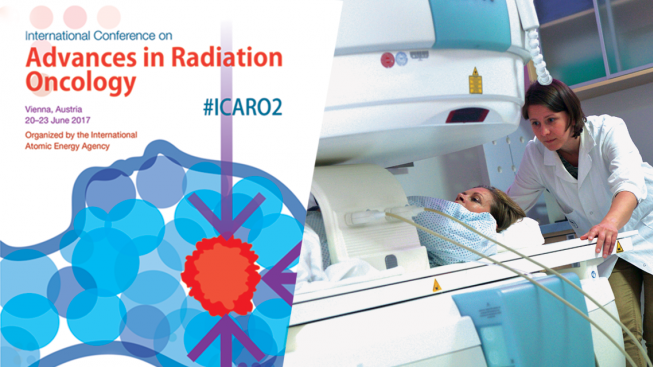IAEA Conference Addresses Key Issues and Recent Advances in Radiotherapy

Treating more cancer patients efficiently, effectively and
safely — making use of the latest advances in technology — presents both
an opportunity and a challenge, and the IAEA can help its Member States
to improve quality and access to cancer care services. This was the
message from IAEA officials at the opening of the second International
Conference on Advances in Radiation Oncology (ICARO2) today.
The conference, which has attracted over 500 participants from 96 countries, is taking place at IAEA headquarters in Vienna from 20-23 June 2017.
“The role of the conference is to bring people together and spread the knowledge on the use of radiotherapy in cancer care,” said Aldo Malavasi, Deputy Director General and Head of the Department of Nuclear Sciences and Application. “With the help of conferences like this the IAEA assists Member States in areas of quality assurance for radiation oncology, radiology and nuclear medicine, dosimetry audits, training and — very importantly — networking.”
Continuous professional advancement is essential if medical personnel are to stay up to date with new developments and this conference provides an important forum not only to share the latest knowledge in the field, but also to review modern technologies, compare experiences, and assess their benefits from different perspectives, he said.
A quarter of the funds disbursed through the IAEA’s technical cooperation programme are targeting projects in health care, particularly in radiotherapy, dosimetry and medical physics, highlighted Dazhu Yang, Deputy Director General of Technical Cooperation. “Since the IAEA began its work in human health 60 years ago, the use of nuclear techniques in medicine has become one of the most widespread peaceful applications of nuclear technology,” he said. The technical cooperation programme supported the participation of over 40 delegates from developing countries at the conference, he added.
Mr Yang referred to various milestones in cancer care achieved by Member States, such as Cambodia, in improving cancer diagnosis and treatment.
From ICARO to ICARO2
ICARO2 builds on the success of the first ICARO conference held in 2009, emphasized May Abdel-Wahab, Director of the IAEA’s Division of Human Health. Since then, the field of radiation therapy has experienced rapid developments, and it is now possible to deliver radiation to the tumour target with ever greater precision, sparing normal tissues. Technological innovations coupled with advances in physics and radiobiology have been the main driving force behind this progress, she said. Many of these developments will be highlighted at the oral and poster sessions throughout the next four days.
“We have witnessed the implementation of new radiotherapy techniques, like intensity modulated radiation therapy (IMRT), image guided radiation therapy (IGRT), stereotactic body radiation therapy (SBRT), proton and heavy ion therapy,” said Abdel-Wahab. “Developing these techniques has one main goal — treating more patients efficiently, effectively and safely.”
The conference, which has attracted over 500 participants from 96 countries, is taking place at IAEA headquarters in Vienna from 20-23 June 2017.
“The role of the conference is to bring people together and spread the knowledge on the use of radiotherapy in cancer care,” said Aldo Malavasi, Deputy Director General and Head of the Department of Nuclear Sciences and Application. “With the help of conferences like this the IAEA assists Member States in areas of quality assurance for radiation oncology, radiology and nuclear medicine, dosimetry audits, training and — very importantly — networking.”
Continuous professional advancement is essential if medical personnel are to stay up to date with new developments and this conference provides an important forum not only to share the latest knowledge in the field, but also to review modern technologies, compare experiences, and assess their benefits from different perspectives, he said.
A quarter of the funds disbursed through the IAEA’s technical cooperation programme are targeting projects in health care, particularly in radiotherapy, dosimetry and medical physics, highlighted Dazhu Yang, Deputy Director General of Technical Cooperation. “Since the IAEA began its work in human health 60 years ago, the use of nuclear techniques in medicine has become one of the most widespread peaceful applications of nuclear technology,” he said. The technical cooperation programme supported the participation of over 40 delegates from developing countries at the conference, he added.
Mr Yang referred to various milestones in cancer care achieved by Member States, such as Cambodia, in improving cancer diagnosis and treatment.
From ICARO to ICARO2
ICARO2 builds on the success of the first ICARO conference held in 2009, emphasized May Abdel-Wahab, Director of the IAEA’s Division of Human Health. Since then, the field of radiation therapy has experienced rapid developments, and it is now possible to deliver radiation to the tumour target with ever greater precision, sparing normal tissues. Technological innovations coupled with advances in physics and radiobiology have been the main driving force behind this progress, she said. Many of these developments will be highlighted at the oral and poster sessions throughout the next four days.
“We have witnessed the implementation of new radiotherapy techniques, like intensity modulated radiation therapy (IMRT), image guided radiation therapy (IGRT), stereotactic body radiation therapy (SBRT), proton and heavy ion therapy,” said Abdel-Wahab. “Developing these techniques has one main goal — treating more patients efficiently, effectively and safely.”

No comments:
Post a Comment